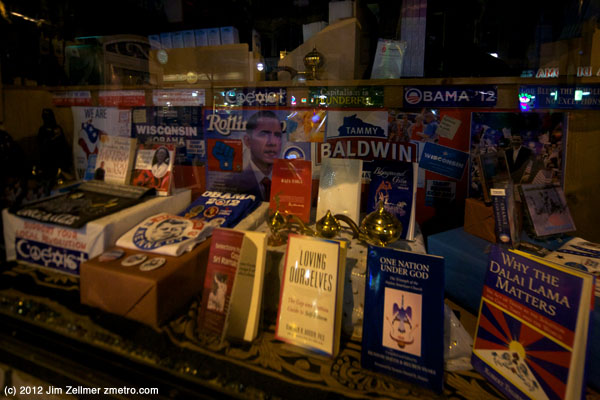As the business models for serious journalism continue to erode where will we get the quality media we need as a society to make important decisions about our future?
I’ve been warning people: “Special interest groups will gladly pay for the media they want you to read, but you won’t pay for the media you need to read.”
Software engineers have a saying: GIGO, garbage in, garbage out.
If you start with garbage data you will get a garbage result. That’s the future we are heading towards, a future where our media is corrupted with information that serves the goals of special interest groups.
Take a look at Australia where multi-billionaire mining magnate Gina Rinehart has been trying to acquire Fairfax Media, publisher of top newspapers, in a bid to counter anti-mining forces. We’ll see more of that as newspapers and other traditional media continue to weaken.
Behind the Iron Curtain Entry 4: Survival sometimes means collaboration. But it is no guarantee of success.
Wanda Telakowska did not begin her career as a Marxist. At different times an art teacher, designer, critic, and curator, Telakowska had in the 1930s been best known for her association with a Polish artistic group called ?ad, which conoisseurs of design history will recognize as a cousin of the British Arts and Crafts movement. ?ad sought to make use of traditional, folk, and peasant craftsmen, who still thrived in parts of southern and eastern Poland, and to use their work as the basis for a new and authentically “Polish” vernacular design. The artists and designers associated with ?ad believed that “contemporary” did not have to mean “modernist” or futuristic. Not everything had to be sleek or simplified in the machine age: folk designs for furniture, textiles, glass and ceramics could, they believed, be brought up-to-date, and even used as inspiration by industry.
By instinct and by training, Telakowska was no communist either. Many left-wing artists of the time, including the Bauhaus designers in Germany, spoke of sweeping away the past in the name of revolution, and starting from scratch. Telakowska, by contrast, retained a distinctly un-Communist, lifelong determination to find inspiration from the past. Nevertheless, after the war, she was determined to continue ?ad’s work, and toward that end she joined the new Communist government. She quickly found that her project—which favored “authentic” peasant art over the slicker modernism of urban intellectuals—overlapped with some of the aims of the Communist Party. As one cultural bureaucrat pointed out, folk art was more likely to appeal to the Polish laborer: “Our working class is closely connected to the countryside and feels more connected to the culture of folk art than to the culture of intellectual salons.”
Madison Prepares for Monday’s Obama/Springsteen Campaign Event


Saturday Farmer’s Market Photos





Dinner at Madison’s Himal Chuli


Who is the worst civil liberties president in US history?
The following interesting question arose yesterday from what at first appeared to be some petty Twitter bickering: who was the worst president for civil liberties in US history? That question is a difficult one to answer because it is so reliant upon which of many valid standards of measurement one chooses; it depends at least as much on the specific rights which one understands the phrase “civil liberties” to encompass. That makes the question irresolvable in any definitive way, but its examination is nonetheless valuable for the light it sheds on current political disputes.
It’s worthwhile first to set forth the context in which the question arose. At their Lawfare blog, Ritika Singh and Benjamin Wittes posted an excerpt of an essay they wrote for a new book on the War of 1812; their essay pertains to the impact of that war on civil liberties and executive power. The two Brookings writers note that despite intense domestic opposition to the war, President Madison “eschewed the authority to detain American citizens in military custody or try them in military tribunals, and more generally, declined to undertake the sorts of executive overreaches we have come to expect – and even encourage – from our presidents in war.”
After Julian Sanchez, I and others tweeted that essay by remarking that Madison refrained from exploiting the war to abridge civil liberties, Slate’s Matt Yglesias’ wrote:
That struck me as a cheap and vapid reply. Nobody was suggesting that Madison was the personification of civil liberties nirvana. Rather, the point was a very narrow and discrete one: he largely refrained from exploiting the War of 1812 as a pretext for abridging extant political rights. Whether he owned slaves – or was otherwise the worst monster in history – does not remotely pertain to, let alone negate, that specific and important historical fact about Madison’s presidency.
Gorgeous Photos From the Front Lines of Outsourcing
When the Electrolux washing machine factory left Webster City, Iowa for Juarez, Mexico almost two years ago, it effectively knocked the town’s middle class to its knees. A sizable portion of the town’s population worked there, and they quickly found themselves scrambling to figure out what came next.
A couple of months after the plant closed down, photographer Brendan Hoffman first visited Webster City, which sits about 75 miles north of Des Moines. He was following former Minnesota Gov. Tim Pawlenty who, at the time, was campaigning in the Republican presidential primary. The plight of the town presented itself to him as the bigger story.
“It was a story that I felt conflicted about and those are the kind of stories I’m most drawn to,” says Hoffman, who is a member of the Prime collective. “Sure, some of the people in Webster City are going to tell you that they got screwed over. But at the same time if we are going to consider this country to be a free-market democracy, whose is to stop [the company] from deciding that they can be more efficient by moving production to Mexico?”
The rise of no-name designers
TWO years ago Bill Small toiled at one of New Zealand’s largest wineries, “pushing numbers around spreadsheets” and dreaming of striking out on his own. Today he and his wife, Claudia, make six wines, including three sorts of Sauvignon Blanc, under their own label. They sell them through Naked Wines, a four-year-old company that claims to be Britain’s fastest-growing online wine seller. Most would-be winemakers must flatter distributors, schmooze potential investors and beg for social-media attention. “We don’t do that shoe leather,” says Mr Small.
Like any online vendor Naked Wines bypasses middlemen and shares the savings with customers. But this is trickier for wines than it is for books. How do you convince oenophiles that they are buying fine vintages for plonk prices? Especially when the same bottle is not for sale at the local off-licence? Naked Wines’ answer is to seek out gifted unknowns, provide a stage and draw an audience. The idea is to create cachet without the slog of building brands.
Obama Defends His Finance Reform Record to Rolling Stone: A Response
The repeal of Glass-Steagall created mega-merged “supermarket” firms that blended insurance, commercial banking, and investment banking services – companies like Citigroup. Lehman Brothers, whose collapse was a major event in the 2008 crisis, was not one of those companies. Therefore, the repeal of Glass-Steagall did not cause the financial crisis.
Now, it is true that Lehman Brothers was just an investment bank, and not one of those supermarket firms. But Lehman Brothers didn’t cause the financial crisis all by itself (more on that in a moment). Moreover, many of the giant mega-merged companies that were spawned by Glass-Steagall did in fact play huge roles in the financial crisis.
For instance, President Obama failed to mention that the company whose merger was only made legal post-factum by Bill Clinton’s repeal of Glass-Steagall – Citigroup – ultimately became the single largest recipient of federal bailout funds, taking in nearly half a trillion dollars in cash and guarantees, according to the Congressional Oversight Panel. Citigroup would almost certainly have gone under in 2008 without that massive $476 billion federal lifeline, and had Citi gone under, the impact would likely have dwarfed that of the collapse of Lehman Brothers.
In fact, as one former regulator noted to me, the fact that the most destrctive collapse in 2008 was from Lehman and not from a commercial bank – well, that is really a historical accident. Had the government elected to bail out Merrill Lynch and Lehman and let Citigroup and Bank of America fail, we’d be having an entirely different conversation today. That could easily have happened: the only thing that’s unique about Lehman Brothers is that then-CEO Dick Fuld and his minions were so loathed by Henry Paulson and the rest of the Wall Street crowd that his bank was kicked out of the lifeboat, when everyone else was ushered on board.
3D Printshow
What a great weekend we had in London! The 3D Printshow was overwhelming and crowded at times, but very interesting because of the people you meet and the stories you hear.
Was it the result of the hype around 3D printing? Or did the revolution really start past weekend? It’s hard to tell. But we can say we never saw more people attending a 3D printing event than this one. Not only designers and software companies appeared; also families, students, hobbyists and people who were just generally interested in this ‘new’ industry were very enthusiastic visitors.